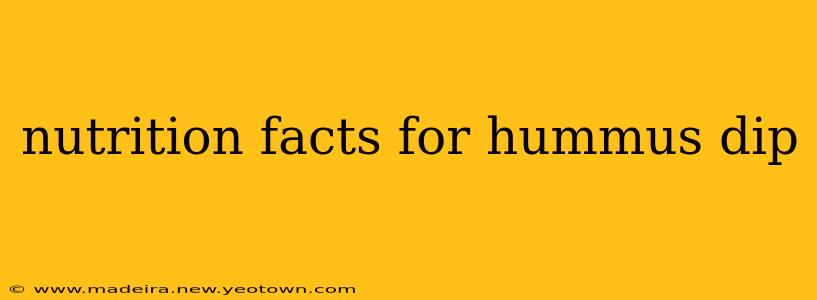Hummus. The creamy, dreamy dip that's taken the world by storm. But beyond its delicious taste and versatile nature, lies a nutritional profile that deserves a closer look. This isn't just a snack; it's a nutritional powerhouse packed with benefits for your body and mind. Let's unravel the mysteries behind this beloved Middle Eastern spread.
What are the main nutritional components of hummus?
The beauty of hummus lies in its simplicity and the nutritional synergy of its core ingredients: chickpeas, tahini, lemon juice, garlic, and olive oil. Each component contributes uniquely to the overall nutritional profile.
-
Chickpeas (Garbanzo Beans): These are the stars of the show, providing a hefty dose of plant-based protein, fiber, and complex carbohydrates. This trio keeps you feeling full and satisfied for longer, aiding in weight management and blood sugar control. They're also a good source of iron and folate.
-
Tahini (Sesame Seed Paste): This adds a rich, nutty flavor and a boost of healthy fats, primarily monounsaturated fats, which are beneficial for heart health. Tahini also contributes to the overall creamy texture and adds minerals like calcium and magnesium.
-
Lemon Juice: More than just a tangy flavor enhancer, lemon juice provides a dose of Vitamin C, a potent antioxidant. It also helps to preserve the freshness of the hummus and balances the richness of the tahini.
-
Garlic: This pungent bulb adds a distinctive flavor and boasts antibacterial and anti-inflammatory properties. While not a significant nutritional contributor in terms of macro-nutrients, its health benefits are noteworthy.
-
Olive Oil: The finishing touch, olive oil provides healthy monounsaturated fats, further supporting heart health and contributing to the overall creamy texture. It also offers antioxidants and anti-inflammatory compounds.
How many calories are in a typical serving of hummus?
The calorie count can vary depending on the brand and the specific recipe. A typical serving size (around ¼ cup or 60g) usually contains between 80-100 calories. However, factors like the amount of olive oil used and additions like extra spices or roasted red peppers can influence this. Always check the nutrition label on the specific product you’re consuming for the most accurate information.
What are the macros (protein, carbs, fat) in a serving of hummus?
Again, variations exist, but a general guideline for a ¼ cup serving includes:
- Protein: Approximately 3-4 grams. This makes hummus a valuable addition to vegetarian and vegan diets.
- Carbohydrates: Around 10-12 grams, mostly from the chickpeas. These are complex carbohydrates, providing sustained energy.
- Fat: Approximately 5-7 grams, largely from the healthy monounsaturated fats in tahini and olive oil.
Is hummus good for weight loss?
Hummus can be a beneficial addition to a weight-loss diet due to its high fiber and protein content. Fiber promotes satiety, helping you feel fuller for longer, reducing overall calorie intake. The protein content further contributes to feelings of fullness and helps maintain muscle mass. However, portion control is key. While hummus is relatively healthy, overconsumption can still lead to weight gain.
Is hummus healthy for diabetics?
Hummus, in moderation, can be part of a healthy diabetic diet. The fiber content helps regulate blood sugar levels, preventing sharp spikes and crashes. However, the carbohydrate content should be considered within the context of an individual's overall daily carbohydrate intake. Consult with a healthcare professional or registered dietitian for personalized advice.
What are the potential health benefits of eating hummus?
Beyond weight management and blood sugar control, hummus offers several other potential health benefits:
- Heart Health: The monounsaturated fats and fiber contribute to maintaining healthy cholesterol levels and reducing the risk of heart disease.
- Improved Digestion: The high fiber content aids in promoting regular bowel movements and improving digestive health.
- Antioxidant Protection: The antioxidants from the chickpeas, lemon juice, and olive oil can help protect cells from damage caused by free radicals.
- Blood Pressure Regulation: The minerals in tahini, like magnesium, can play a role in maintaining healthy blood pressure levels.
Conclusion:
Hummus is much more than just a delicious dip; it's a nutritious and versatile food with a wide array of potential health benefits. By understanding its nutritional profile and incorporating it mindfully into your diet, you can enjoy this culinary delight while reaping its numerous advantages. Remember to always read nutrition labels for specific details and to consult with healthcare professionals for personalized dietary advice.

